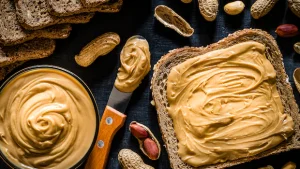Peanut butter has several health benefits due to its nutrient profile. Here are some of the key health benefits of peanut butter:
Rich in Protein: Peanut butter is a great source of protein, with two tablespoons providing around 7 grams of protein. Protein is essential for building and repairing tissues in the body, and it also helps keep you feeling full and satisfied after meals.
High in Healthy Fats: Peanut butter is high in monounsaturated and polyunsaturated fats, which are healthy fats that can help reduce the risk of heart disease. These fats also provide energy for the body and help the body absorb fat-soluble vitamins like vitamin E.
Good Source of Fiber: Peanut butter is a good source of fiber, with two tablespoons providing around 2 grams of fiber. Fiber is important for digestive health, and it can also help lower cholesterol levels and regulate blood sugar levels.
Contains Vitamins and Minerals: Peanut butter is a good source of several vitamins and minerals, including vitamin E, magnesium, and potassium. Vitamin E is an antioxidant that helps protect cells from damage, while magnesium is important for bone health and muscle function. Potassium helps regulate blood pressure and can reduce the risk of stroke.
May Help Lower the Risk of Heart Disease: Several studies have shown that consuming nuts and nut-based products like best peanut butter can reduce the risk of heart disease. This is likely due to the high levels of healthy fats, fiber, and other nutrients found in these foods.
May Help Control Blood Sugar Levels: Peanut butter has a low glycemic index, which means it can help regulate blood sugar levels. This makes it a good choice for people with diabetes or those trying to maintain healthy blood sugar levels.
Overall, peanut butter is a nutritious food that can be a great addition to a healthy diet. Just be sure to choose natural peanut butter that doesn’t contain added sugars or oils, as these can add unnecessary calories and unhealthy fats to the product.

Is peanut butter a healthy keto meal option?
Peanut butter can be a healthy keto meal option, but it is important to choose the right type and portion size.
Firstly, it is important to choose natural peanut butter that does not contain added sugars or vegetable oils, which can add unnecessary carbohydrates and unhealthy fats to the product. Look for peanut butter made from just peanuts or peanuts and salt.
Secondly, it is important to watch portion sizes, as peanut butter is calorie-dense and can add up quickly. A serving size of peanut butter is typically two tablespoons, which provides around 7 grams of protein, 16 grams of fat, and 3 grams of net carbohydrates.
To make a keto-friendly meal with healthy peanut butter, you could spread it on celery sticks, cucumber slices, or almond flour crackers. You could also mix it into a low-carb smoothie or use it as a dip for keto-friendly vegetables like bell peppers or broccoli. Peanut butter can also be added to keto-friendly recipes for baked goods or used as a topping for keto-friendly pancakes or waffles.
Overall, peanut butter can be a healthy keto meal option as long as you choose the right type and portion size and incorporate it into a well-rounded, low-carb meal plan.
Is peanut butter junk food or healthy?
Whether peanut butter is considered junk food or healthy depends on the type of peanut butter and the amount consumed.
Healthy Peanut butter made from just peanuts or peanuts and salt can be a healthy food. It is a good source of protein, healthy fats, fiber, vitamins, and minerals. It can also provide health benefits such as reducing the risk of heart disease and controlling blood sugar levels.
However, some types of peanut butter are not as healthy. Peanut butter that contains added sugars, hydrogenated oils, or other additives can be high in calories, unhealthy fats, and added sugars. These types of peanut butter can contribute to weight gain and increase the risk of health problems like type 2 diabetes, heart disease, and high blood pressure.
Therefore, it is important to read the ingredient list and choose natural peanut butter without added sugars or oils. It is also important to watch portion sizes and incorporate peanut butter into a well-balanced diet. A typical serving size of peanut butter is two tablespoons, which provides around 200 calories, so it is important to consume it in moderation.
In conclusion, peanut butter can be a healthy food as long as you choose the right type and consume it in moderation.

